Learn how to make essential oils at home and discover more amazing benefits you can get from these natural wonders.
We will give you a thorough guide plus the best tips and tricks in making essential oils at home using dried herbs and other plants. We will be extracting the essence of your favorite herbs and flowers right in the comfort of your kitchen!
In this article:
- How to Make Essential Oils
- What You Need to Know When Making Essential Oils
- Mood-Boosting Essential Oils
- 5 Ways to Use Essential Oils
RELATED: The Homesteader’s Secret Essential Thieves Oil Recipe
Learn How to Make Essential Oils Like a True Homesteader
Click here to jump to the infographic.
How to Make Essential Oils
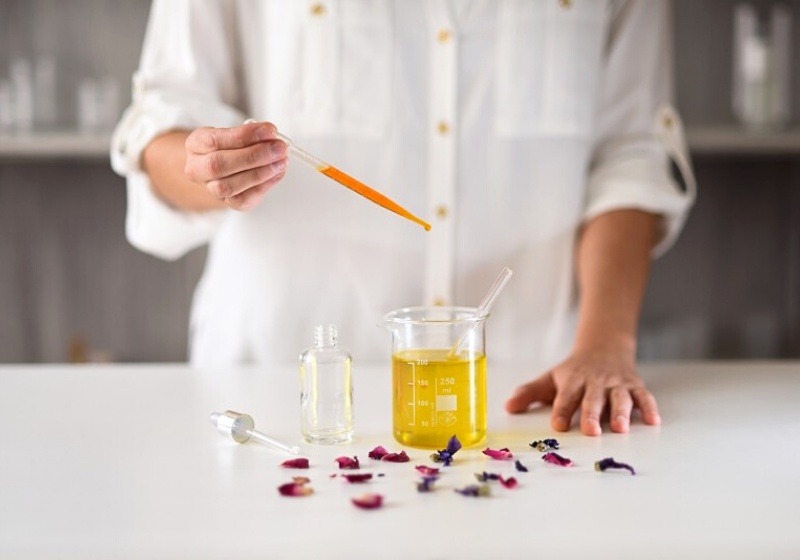
There are three methods to get essential oils. These are extraction, distillation, and expression. The distillation process is the most complicated. It requires specialized equipment and careful monitoring.
As for the expression method, the product is not usually classified as an essential oil. This leaves us with the extraction method. In this tutorial, we will try rose essential oil-making, so let's get started!
What You'll Need:
- Flowers or plant parts to extract (in this case rose petals)
- 120-proof vodka
- Clear quart glass jar with a lid
- Small dark-colored bottle
- Porcelain-coated strainer
- Small glass bowl
- Tight-weave cheesecloth
- A spoon and medicine dropper
Step 1: Prepare Your Choice of Plant
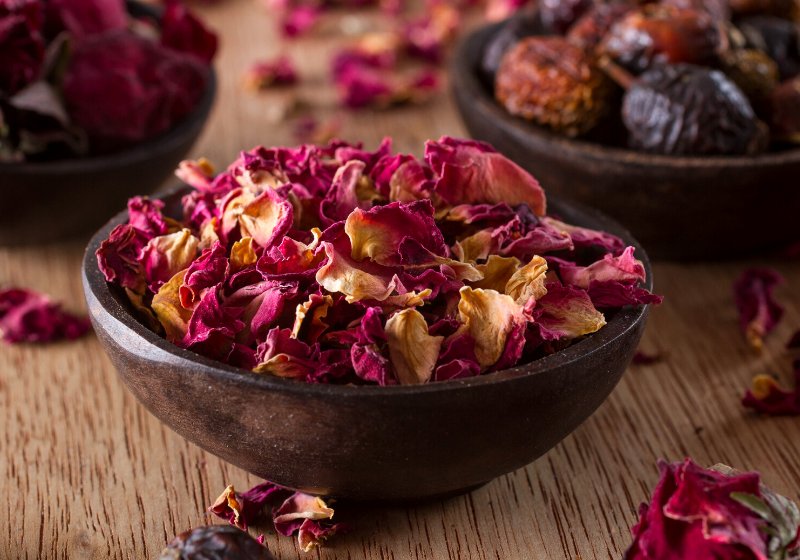
You can use any kind of plant, from herbs, scented flowers, to fruits. It all depends on the plant essence you want to be extracted. In this tutorial, we will be using roses. The more homegrown roses you have, the better.
You'll need pounds and pounds of plant material to make a small amount of essence. Prepare the roses by using a dehydrator to evaporate their natural water content. The roses will be ready when they start to wilt.
Step 2: Prepare the Jar
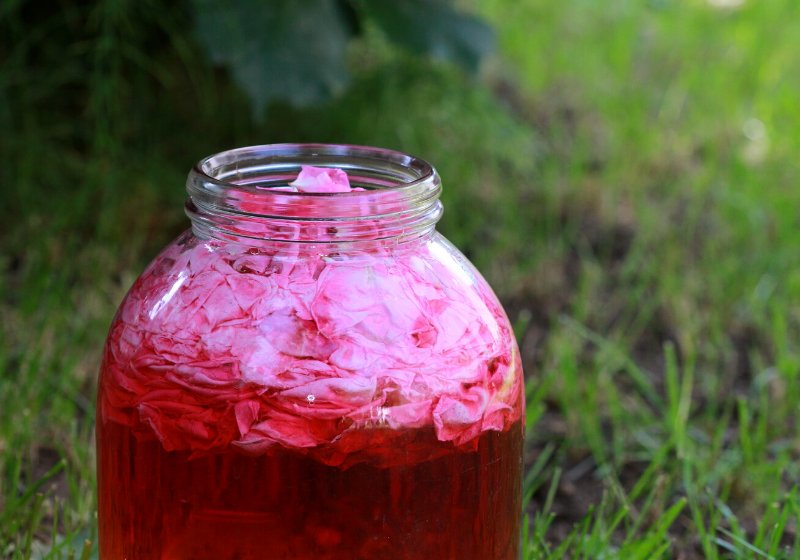
Prepare jars and fill them with rose petals. Pour vodka into the jar until the petals are submerged. Place the jar in a dark corner of the kitchen cupboard where it can sit undisturbed at room temperature.
About three times a day, take the jar out and give it a good shake for several minutes. Repeat daily until you see the roses losing color, which could take up to a week.
RELATED: Homemade Air Freshener with Essential Oils
Step 3: Straining Vodka Solution
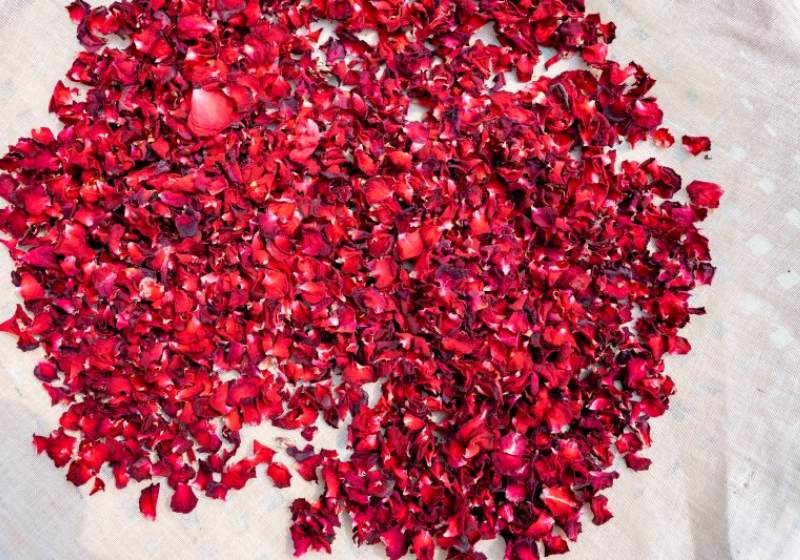
Wearing protective gloves, take out the jar and prepare to strain. Strain out the plant material from the vodka by using a porcelain-coated strainer. Be careful not to spill any amount of liquid.
Shake the roses into the cheesecloth and squeeze it out by hand to get every last bit of vodka out. By this time, the vodka will smell terrible but don't worry, that's normal.
Step 4: Repeat Soaking Process
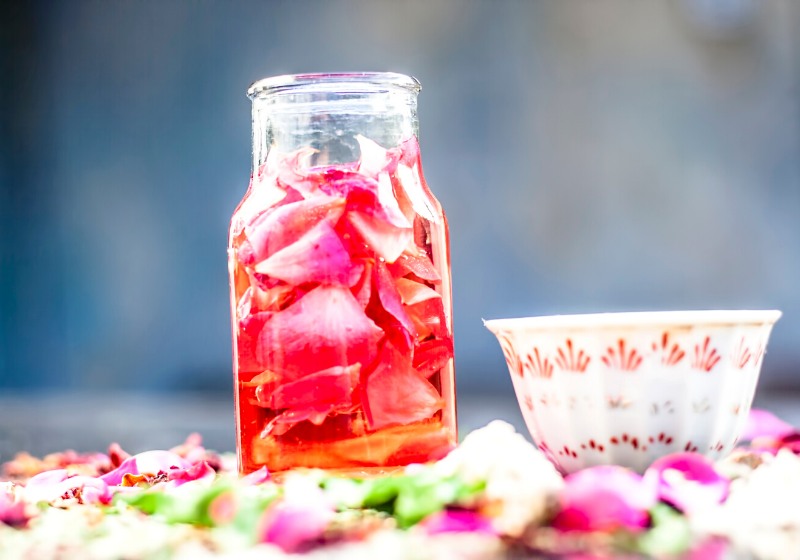
Using the same vodka, repeat the rose soaking method several more times with a new batch of rose petals. Make sure not to waste vodka when straining.
If needed, you can add a little more vodka to make sure the rose petals are submerged. The more you do this, you will be able to extract more of the essential oils.
Step 5: Storing Vodka Solution
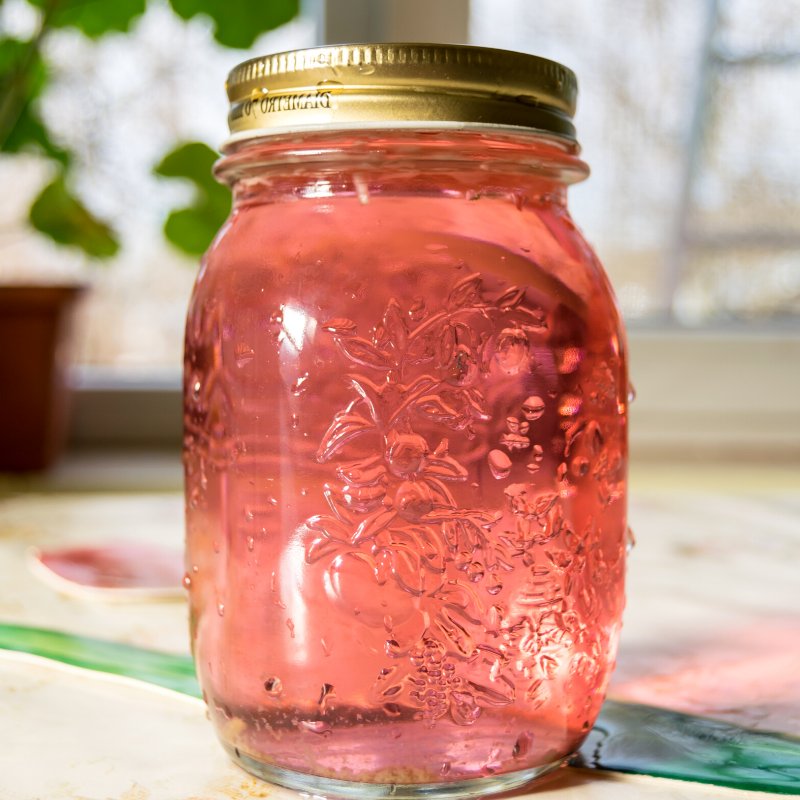
Once you're done with the rose soaking, strain as usual. But this time, return the vodka into the quart glass and seal it. Put it in the dark corner of the cupboard again, leaving it undisturbed for a day or two.
By this time, you will see some separation starting to occur. The vodka will separate from the essential oils and other plant matter.
Step 6: Freeze Solution
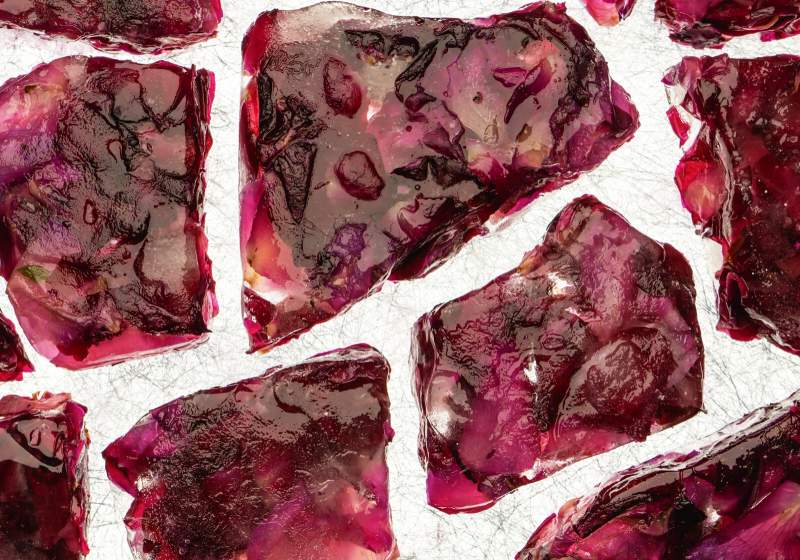
Place the jar in the freezer. This is the cool part–vodka does not freeze. So, only the essential oils and other plant materials will solidify.
Step 7: Strain Solution
Now, you will have to move fast with extra caution before the essential oil melts. You will need a piece of cheesecloth laid inside a glass bowl. Use another piece of cheesecloth secured around a clear canning jar so it dips inside the neck.
You will also need another small glass bowl and a small dark bottle which will hold the essential oil. Have a spoon and dropper ready as well.
Step 8: Harvest Essential Oils
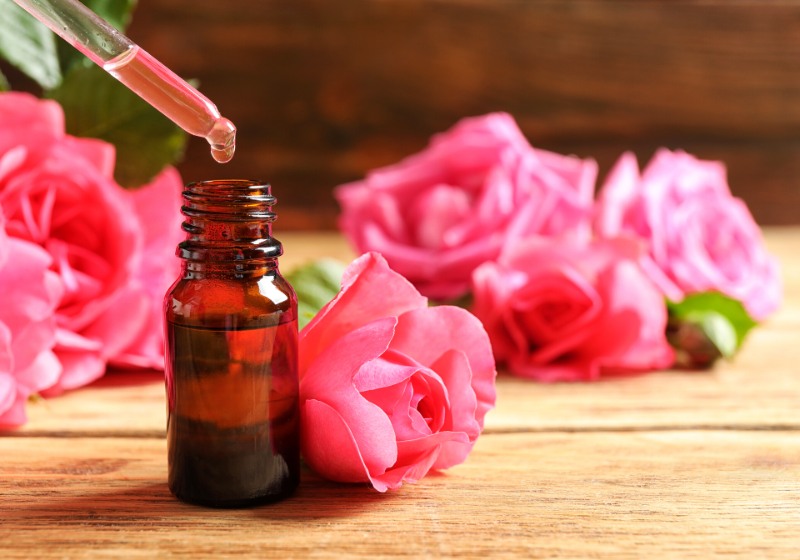
Remove the jar from the freezer. Skim the gunky plant material off the vodka and place it on top of the cheesecloth laid inside the bowl. Pour the vodka into the other glass jar with the loose cheesecloth.
Move quickly to pick out any frozen bits using a dropper and place them inside the small dark bottle. The frozen bits are the essential oils.
What You Need to Know When Making Essential Oils
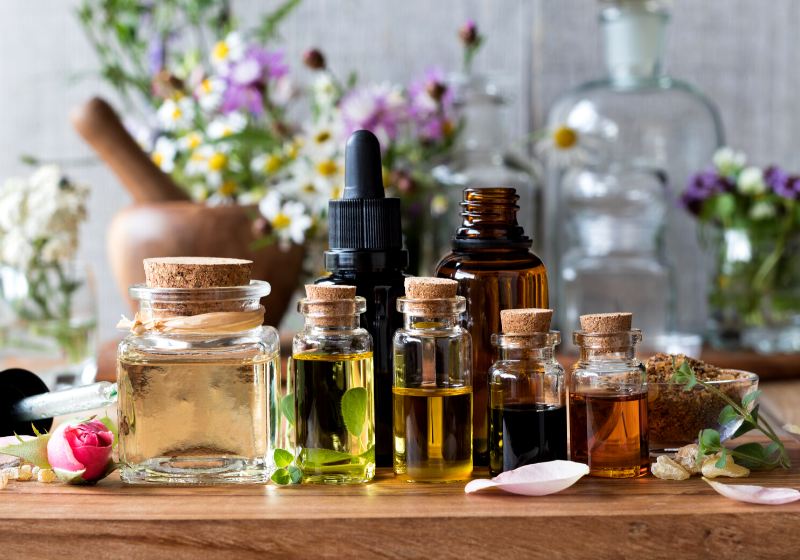
- Essential oils are not oils that contain fatty acids. Instead, they are the concentrated plant essence.
- What is good in a plant reflects in its essential oil, so you can use it for personal care, disinfection, or healing.
- Essential oil examples are peppermint, tea tree, and roses. They are known for their antibacterial, antifungal, and antiviral properties.
- Essential oils are distinct from fragrance oils. They only mimic the scents of plants and do not have the essential oil benefits.
- Essential oils are hard to find in localities, which is why they are expensive. This is a good reason why it's good to learn the art of making essential oils from dried herbs yourself.
Mood-Boosting Essential Oils
There are many benefits of essential oils, and some essential oils are known to boost mood and increase the serotonin levels in the body. Here are some mood-boosting essential oils:
- Mandarin Essential Oil
- Lime Essential Oil
- Sweet Orange Essential Oil
- Bitter Orange Essential Oil
- Bergamot Essential Oil
- Grapefruit Essential Oil
- Peppermint Essential Oil
- Spearmint Essential Oil
- Lavender Essential Oil
- Chamomile Essential Oil
- Tangerine Essential Oil
5 Ways to Use Essential Oils
There are different ways to use essential oils, and you can blend them together as well! Here are 5 ways you can use your essential oils to boost your mood:
- Diffuser Blend: Add 2 drops of desired essential oils with the required amount of water (depending on your diffuser) and enjoy!
- Roller Blend: Add 2 drops of desired essential oils to a roller bottle and fill the rest of the bottle with jojoba oil or coconut oil. You can use this blend on your arms, legs, chest.
- Massage Oil Blend: Blend 2 drops of desired essential oils into a 1oz bottle then fill the rest of the bottle with almond oil then massage it onto your skin.
- Bath Salt Blend: Add 3-5 drops of desired essential oils to castile soap and add it to your bathwater.
- Room Spray Blend: Add 2 drops of desired essential oil into a 1oz spray bottle and fill the rest with distilled water
Reminder: Do not apply undiluted essential oils directly to your skin. Essential oils need to be diluted in a carrier oil before being used.

Now you've got a pretty good idea about how to make essential oils on your own. You also now know how to extract essential oils from herbs at home with all your greens from the garden.
With time, you will be able to master your way into making essential oils. Who knows how you will be able to make more out of this new and amazing homesteading skill!
Did you find these ideas and tips helpful? Let us know in the comments section below!
Up Next:
- Use These Essential Oils for Pregnancy
- Stress Relieving Lavender Candles You Can Make At Home
- Creative Valentine’s Day Ideas | Sustainable Crafts For Your Love
Fellow homesteaders, do you want to help others learn from your journey by becoming one of our original contributors? Write for us!
Follow us on Facebook, Instagram, Pinterest, and Twitter!
Editor’s Note – This post was originally published in April 2020 and has been updated for quality and relevancy.

While I can appreciate the thrifty nature of this post, these are not essential oils. These are infused oils. Essential oils have no carrier oil. The oil is nothing but the oil from the plant. They go through a very extensive distilling process. That is why they are so expensive.
I was wondering if it absolutely has to be 120proof vodka will other proofs work?
You can use 94% Global Alcool. It’s available in LCBOs for about $98/1.14l (not all stores) or in QC for $67/1.14l.
Can a moonshine of approx 160-165 proof replace the vodka?
This isn’t an infused oil. When it’s vodka you’re making a tincture.
It’s only a tincture when the oils are NOT separated from the extraction liquid. The freezing process separates the plant oils from the vodka and allows you to remove the oils from it.
thanks this was very helpful as I was trying to figure out a cost effective way to have my herbal oils
Step 2. What is in the jar? The instructions say to “Prepare the jar” Maybe I need to reread a few times.
I’m sleep-deprived, and sometimes stressed. And essential oils became part of my daily life. I am so glad that I found this helpful post.
Get yourself a weighted blanket. I have a 30 lb one & it has relieved stress, anxiety & allows me to have a deep sleep.
Thank you, this was a clear and simple step by step process. I wish I had known about the freezing step a few months ago. Also, I love your humor like in step 3.
This method only produces extracts that, while very useful, are NOT essential oils. The post is rather misleading…
This makes a tincture! Not an essential oil!
Nice article that is….keep it up
Very informative post! Thanks for sharing this wonderful post. How easily I can make my own essential oils by following your steps. I am so excited to try these methods.
Nice article, well explained.
Can this be used to scent soap?
Great step by step process. Do you use the left over vodka for anything else, once you have harvested the oils from it? It seems a waste to just throw it out.
Can you use this method with raisins / frankincense / gums?
What about cinnamon oil for mood?
Great post! Thanks for the step-by-step!
Love natural healing. Essentials are my favorite.
what happens to the vodka you used to extract , is it still useful in other ways?
Using alcohol is not making essential oils, it makes tincture. Essential oils are void of alcohol or water and merely just the plant oils.
Where might I obtain a porcelain-coated strainer? I can’t find one anywhere on the interweb! Do you have a source, or am I looking under the wrong name? Thanks in advance!
What is the difference in the oils pulled from the plants using the alcohol method versus distillation?